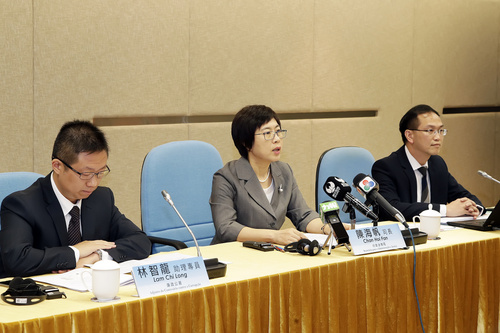 The Secretary for Administration and Justice, Ms Chan Hoi Fan, gives details during a press conference regarding the public consultation on revisions to the Legislative Assembly Election Law.
The Secretary for Administration and Justice, Ms Chan Hoi Fan, gives details during a press conference regarding the public consultation on revisions to the Legislative Assembly Election Law.
A majority of the opinions received via a public consultation process shows support for the Government’s proposals regarding revisions to the Legislative Assembly Election Law, said the Secretary for Administration and Justice, Ms Chan Hoi Fan. The opinions expressed generally agreed with the Government’s proposals with regard to the following matters: the need to specify rules for electoral campaigns and to strengthen supervision for those campaigns; the need to clarify who is qualified to be a candidate; and the need to step up efforts against bribery. The Government ran a 30-day public consultation – from 7 May to 5 June inclusive – regarding proposed revisions to the Legislative Assembly Election Law. During the period, the Government held a total of seven public sessions with 963 participants. A total of 128 attendees shared their comments during the public sessions. Another 225 written opinions were submitted to the Government. The Government would take into consideration all the comments that were submitted; and would evaluate whether they conform to Macao’s legal system and could feasibly be incorporated within it, the Secretary said on Thursday (28 July) during a press conference. Regarding management of electoral campaigns, most of the opinions received during the consultation period supported the idea of setting up a mechanism further to monitor every ticket’s campaign expenses; and of making public the information on expenses via an online platform. Some comments suggested electoral expenses should not exceed 3 million patacas per ticket. The Government found most opinions were in favour of the introduction of the concept of criminal responsibility for infringement of provisions of the Law. They were also mostly in favour of creating a definition of electoral activity; including of any electioneering done outside Macao. Some comments expressed doubts about whether effective enforcement action could be taken against any electioneering that might be done outside Macao. Some comments also voiced doubts about whether effective enforcement action could be taken against oblique or unfavourable comments – against any candidates – that might be expressed via social media or other online platforms, where the computer server for the platform was based overseas. The Secretary said provisions regarding regional judicial cooperation and the existing mechanism for legal cooperation would be the basis for handling any such cases. Some comments suggested nullifying an elected member’s right to sit in the Legislative Assembly if a court ruled that bribery had been used in order to secure their election. A similar suggestion had been made prior to revisions in 2008 to the Legislative Assembly Election Law, said Ms Chan. The Government would need further study on the matter, as the suggestion was contrary to the Basic Law, she added. Regarding management of electoral affairs, a majority of comments showed support for the Government’s suggestions on the following: the need to form the relevant Electoral Affairs Commission well in advance of each election; the need to include a member of the Public Prosecutions Office in the Electoral Affairs Commission; the need to specify the appeal mechanisms available in cases where a ruling negatively affects a campaign team; and the need to appoint a body to handle minor cases of rule infringement. Most comments also agreed that electoral instructions should have the force of law once published on electoral websites and newspapers. With regard to comments suggesting each Electoral Affairs Commission should also include a member from the Commission Against Corruption (CCAC), Ms Chan said that might cause conflict regarding CCAC’s role in an election. If pursued, it would mean CAAC acting as an electoral regulator and as a body to monitor elections. Ms Chan said a ban on elected members of the Legislative Assembly holding any political position in a foreign country – a measure contained in the Government’s proposals – could prevent issues relating to dual allegiance. Elected Assembly members must swear allegiance to Macao, which is an inalienable part of the People's Republic of China. The opinions received on the Legislative Assembly Election Law are included in a final report on the consultation process. The report, available in Chinese and Portuguese, can be obtained at: http://ceal.elections.gov.mo/zh-hant/lastest-news


